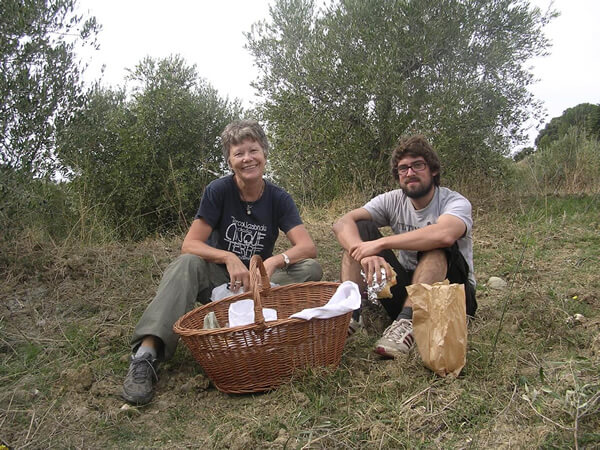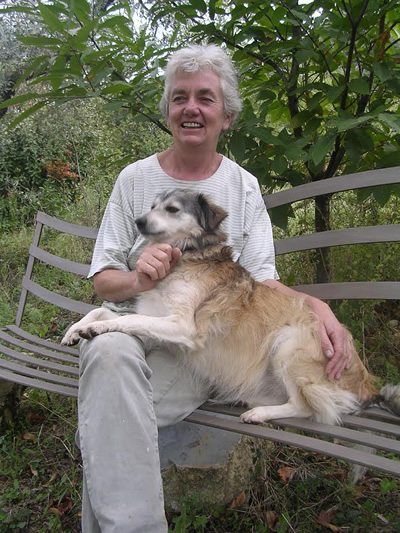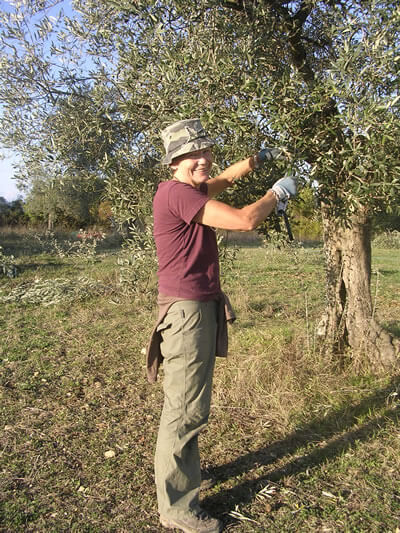Volunteer in Italy at an Olive Farm with WWOOF
Rewarding Work for People of All Ages
Article and photos by Venetia Sherson
 |
| Venetia with a friend while volunteering with WWOOF in an olive grove. |
Several things strike you immediately about Catalina. One is her hair; a wild mane of chestnut curls that refuse to be contained by a range of colorful headbands, tea cozy hats and an Akubra left behind by an Australian lover. Another is her car: a buttercup yellow, battered VW with her name written in Italic script across the bonnet. Given her propensity for speed, the color is not a sage choice; it is too easily recognized by the local Carabiniere (police).
Then there is her tendency to act on impulse. “Have you a swimming suit?” she asks as we roar out of the Rosignano railway car park where she met my train from Rome. “No,” I say. “I ditched it in Sicily to save luggage weight. I didn’t think I would need it in October; it being too cold to swim.” She glances at me from under her curls and smiles.
Ten minutes later we are both standing on the beach in our knickers in full view of the local fisherman lined up on the wharf. I met this woman less than an hour ago and already I have seen her nipples. “Quando a Roma (when in Rome…),” she says, as she dives into the Mediterranean, striking out towards the open sea where the oil tankers are parked waiting to berth at Livorno. I have no option but to follow. “Who is your friend?” calls one of the fishermen in Italian, as we swim past. “Her name is Venetia and she is from the other side of the world,” says Catalina. “She is a WWOOFer and she has come to help me pick olives.”
What Does it Mean to be a WWOOFer?
The acronym WWOOF has two translations: Willing Workers on Organic Farms or Worldwide Opportunities on Organic Farms. The second option is used in countries where there are problems with migrant workers, to avoid issues with local authorities. But the philosophy is the same for both: a worker offers their labor in return for room and board. WWOOF farms exist all over the world, including New Zealand. Visits can last for a week or several months, depending on the needs of the host farms.
The organization was the brainchild of British secretary Sue Coppard who, in 1971, set out to provide city people with a rural experience and arranged working weekends on organic farms. Nearly four decades on, the aims are still the same: to let volunteers experience life in a rural setting and learn about organic farming.
Becoming a WWOOFer at 59
I thought about becoming a WWOOFer myself in my 59th year when I was facing up to another Big Birthday. I had traveled to Italy several times as a tourist or as a journalist, but I wanted to spend more time off the tourist track and, hopefully, improve my Italian. My main worry was that WWOOFing was only for the young. I envisaged an army of bronzed young backpackers working in the fields and sleeping under the stars as I had done when I was 20. So I emailed Bridget Matthews who runs the WWOOF Italia organization. She replied, “Age is no problem, our oldest WWOOFer is 86 and we have just had two delightful 58-year-olds at our own farm.”
 |
| WWOOF Italia adminstrator Bridget Matthews and friend. |
The Farms I Chose in Italy
My criteria were simple: I wanted farms that were not too remote, offered work I could handle, and a proper bed. From more than 300 listed properties, I chose three: Bridgette’s own farm at Castagneto Carducci, Catalina’s property at Nibbiaia, and a farm at San Casciano Val di Pesa, owned by a New Zealander and her husband. I packed a hardy pair of gardening gloves, blister plasters, thermals, and my laptop before setting off.
I arrived in Tuscany in late October when the countryside reveals its finest colors. The olive trees were heavy with black and green fruit; the grape leaves had turned to burgundy and the newly-ploughed earth was a rich dark brown. From the train I could see harvesters shaking and combing the olives on to giant nets beneath the trees. There seemed to be hundreds of people in the fields. Yet finding farm labor is an increasing problem as young Italians leave the land. Migrant workers from Africa and Romania fill the gaps, as do WWOOFers. Every so often a bulletin will be posted online: “Help needed URGENTLY with harvest.” And WWOOFers will answer the call. One farmer said she had hosted a young couple each harvest for eight years, during which time they had two children.
Volunteer Farm Work Harvesting Olives on Catalina’s Farm
Catalina’s farm was on a steep hill overlooking the sea, 10km south of Livorno. Not long after I arrived, she swore loudly and ran off. I tentatively followed her into the olive grove where she was sprinting through the trees, screeching like a banshee, chasing a flock of motley sheep. “We must run them. They will eat the olives. They belong to the bloody bastard on the hill,” she said. So that is what we did. My first official WWOOFing chore was mustering. I barked like a Huntaway and flapped my arms while Catalina swore in English, German and Italian. I learned later she had a master’s degree in linguistics.
The working days at the farm were long and hard. We rose at 8 and were in the fields by 9, moving from tree to tree, stripping the fruit from the branches with wide-toothed plastic combs. On day three, a young Swedish WWOOFer, Gustav, joined us. He told me he had been a WWOOFer for two months in Italy and had spent only 10 Euro in that time. You can see why WWOOFing appeals to the young.
WWOOFing at Castagneto Carducci
My next farm was Bridget Matthews’ property at Castagneto Carducci. Bridget has been a WWOOF host since 1986, and has hosted more than 300 workers. She says the WWOOF rules cover the expectations of hosts and workers. There are sometimes disputes and occasionally serious complaints but they can be leveled from both sides. WWOOFers sometimes believe they are worked too hard (the working weeks vary from 5-6 days); hosts sometimes believe the WWOOFers do not earn their keep. WWOOFing is certainly not a free lunch. The work can involve pruning, clearing scrub, weeding, caring for animals, and building barns or stone walls. Domestic chores are out of bounds. The expectation is that WWOOFers will learn something from the experience that will benefit the planet.
WWOOF farms are often small and some are self-sufficient. Bridget’s property was in a deep valley, so quiet you could hear the distant neighbors’ conversations. The farm had electricity but it was carefully conserved. Telecommunication was erratic at best and to phone home I had to stand on a tree stump at the highest part of the property. My chores ranged from collecting eggs and hazelnuts to clearing brambles with an old-fashioned scythe.
Volunteering at a Third Farm in Tuscany Harvesting Olives
The third farm was owned by Kirsten Lockie, an artist, who had come to Italy from New Zealand as a student and fallen in love with Pascal Goldschmidt, a lute maker. More than 20 years later the couple and their three children grow olives and practice their art on a beautiful Tuscan hilltop near San Casciano Val di Pesa, 17km (10 miles) south of Florence. Their home is a traditional farmhouse with a basement that was once a barn, which is where the WWOOFers stay.
Kirsten and Pascal have up to five WWOOFers working on their property during the busy seasons. There were two others in residence when I arrived: Terry, an Australian, was there to learn about olive growing in Italy and Linda, an American Steiner teacher, was on a year’s sabbatical.
The aim was to pick 50 crates within three days to meet the quota for the oil press. And we were on target until The Bug struck. Pascal succumbed first. Then Linda went down. Terry had already departed to Florence. We needed two drivers to transport the olives and Kirsten and I were the only ones standing. “Can you do it?” she asked. I considered the reasons not to: I did not have an international driver’s license; the trip would be at night, largely on the 6-lane highway in the direction of Florence, and my vehicle would be a Jeep heavily laden with olive crates. I had never driven a Jeep. “No problemo,” I heard myself say again.
It was an understatement to say the trip was hazardous. I stalled the Jeep twice before leaving the property and almost backed over a bank, which would have delivered the olives back to the field from where they had come. On the highway to Florence, I was carried along by a phalanx of Florentine drivers all of whom appeared to be late for dinner. We made it to the olive press within minutes of our allocated time and the oil that trickled from the press 50 minutes later tasted as good as fine champagne.
When I left Tuscany, I was 5 kilos lighter. I had worn through three pairs of gardening gloves and two pairs of sturdy walking shoes. In my backpack were two liters of the finest olive oil in Italy. “Will we see you next harvest?” asked Kirsten. “Reserve my bed,” I said. “I’ll need more oil by then.”
 |
| Venetia volunteering with WWOOF picking olives at Kirsten and Pascal's property near San Casciano Val di Pesa. |
More Information About WWOOF
What is it? WWOOF stands for Worldwide Opportunities on Organic Farms or Willing Workers on Organic Farms. It is an international network linking people who want to work on organic farms with people looking for volunteer help.
How does it work? In return for voluntary labor, WWOOF hosts offer food, accommodations, and opportunities to learn about organic lifestyles.
Who can do it? Anyone who can help their hosts with tasks for an agreed number of hours. Age is not a barrier but, for most farm work, you need to be physically fit. Many farms are happy to host workers with children.
What work do WWOOFers do? The work is varied and may include harvesting, pruning, planting, fruit picking, scrub clearing, weeding, hay making, building, producing food, and looking after animals.
What about accommodations? Some farmers offer accommodations in their home; others offer outside accommodations in caravans or tents.
How many hours do I work? That depends on the host. On some farms it can be as few as 4-5 hours a day; on others up to eight hours for six days a week during harvesting.
How long can you stay? Most farms state a minimum of one week’s stay. Some WWOOFers stay on the same farm for several weeks and even months, depending upon their host’s needs.
Do I need to speak the language of the country? Many WWOOF hosts are multi-lingual, but WWOOFing offers a chance to learn or improve a new language.
How do I find farms? Contact the WWOOF organization in the country you want to visit. For a small membership fee of 35 Euros you will receive a list of farm hosts and advice about WWOOFing, including visas, insurance, etc. Farm visits are arranged directly with farm hosts.
Check the WWOOF International for further details about the organization and go directly to the Italian WWOOF website to become a member and choose your farm! |
In the year she turned 60, journalist and former newspaper editor Venetia Sherson dumped her Blackberry and briefcase and headed to Italy for four months to work as a WWOOFer. She spent her days slashing brambles and climbing olive trees and the nights planting crops by the moon.
|
